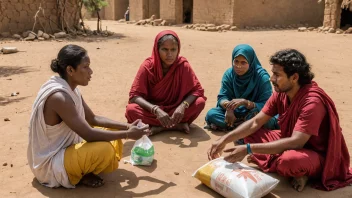Introduction
Homelessness is a pressing issue that affects millions of people worldwide. Faith-based initiatives have emerged as powerful forces in combating this crisis, leveraging community support, compassion, and spiritual guidance to offer solutions. In this article, you will learn how faith-based organizations are addressing homelessness, the steps you can take to get involved, and the impact these initiatives are making in local communities.
Step 1: Understand the Scope of Homelessness
Before engaging with faith-based initiatives, it’s important to grasp the complexities surrounding homelessness. This understanding will enable you to contribute more effectively. Here are some key points to consider:
- Statistics: Familiarize yourself with local and national homelessness statistics.
- Causes: Learn about the various factors contributing to homelessness, such as economic instability, mental health issues, and lack of affordable housing.
- Demographics: Understand who is affected by homelessness – families, veterans, youth, and the elderly.
Step 2: Research Local Faith-Based Organizations
Identify faith-based organizations in your area that focus on homelessness. Some common types of organizations include:
- Churches: Many local churches have outreach programs dedicated to helping the homeless.
- Nonprofits: Faith-based nonprofits often provide shelter, food, and rehabilitation services.
- Community Coalitions: Look for groups that unite various faith organizations to tackle homelessness collectively.
Step 3: Volunteer Your Time
One of the most impactful ways to support faith-based initiatives is through volunteering. Here’s how you can get involved:
- Contact Organizations: Reach out to the organizations you researched in Step 2. Inquire about volunteer opportunities and their specific needs.
- Attend Orientation: Many organizations require a volunteer orientation. Attend these sessions to understand their mission and how you can contribute.
- Commit Your Time: Sign up for regular shifts or events. Consistency helps build relationships and trust within the community.
Step 4: Participate in Fundraising and Awareness Campaigns
While this article avoids fundraising, participating in awareness campaigns is crucial. Here’s how you can help:
- Share Information: Use social media to share posts about homelessness and the initiatives addressing it.
- Organize Events: Work with your faith community to organize events that raise awareness and educate others about homelessness.
- Advocate: Speak to local leaders and advocate for policies that support affordable housing and mental health resources.
Step 5: Build Relationships with the Homeless Community
Building relationships with individuals experiencing homelessness is vital. Here’s how to approach this:
- Listen Actively: When interacting with homeless individuals, listen to their stories and experiences without judgment.
- Offer Support: Provide assistance in the form of food, clothing, or resources that can help them access services.
- Encourage Participation: Invite individuals to participate in community events or activities that foster a sense of belonging.
Step 6: Reflect on Your Experiences
After engaging with faith-based initiatives, take time to reflect on your experiences. Consider the following:
- Personal Growth: Reflect on how this involvement has changed your perspective on homelessness.
- Community Impact: Evaluate how your contributions have made a difference in the lives of others.
- Future Involvement: Decide how you want to continue your involvement moving forward.
Conclusion
Faith-based initiatives play a crucial role in addressing homelessness through compassion, community, and action. By understanding the issue, researching local organizations, volunteering, participating in awareness campaigns, building relationships, and reflecting on your experiences, you can make a significant difference. Every small step counts, and together, we can create a more inclusive and supportive society for those in need.






